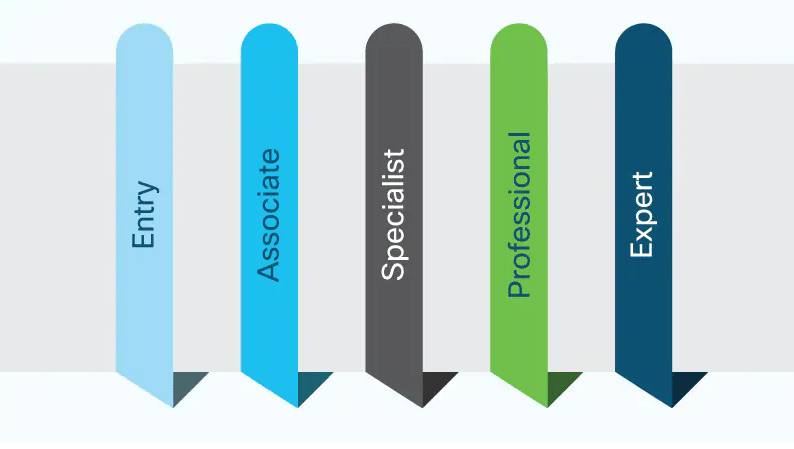If you’ve ever wanted to learn more about the IT field or strengthen your existing skill set, pursuing Cisco certification training may be for you.
There are many reasons to explore and pursue Cisco certification, whether you’re in an existing IT position or you’re looking to break into the rapidly expanding field.
Not familiar with Cisco certifications, what they mean, and how they could benefit you? That’s okay. Here’s what you need to know about Cisco training — and why you may want to take it.
Overview of Cisco Certifications

What Are Cisco Certifications?
Cisco Systems, an industry-recognized developer and manufacturer of networking and telecommunications equipment, offers a wide range of different certifications at various professional levels. According to cisco.com, these certifications help to prepare aspiring tech professionals for the career they want and stay competitive in the workforce.
Types of Cisco Certifications
- Entry: CCT (Cisco Certified Technician)
- Associate: CCNA (Cisco Certified Network Associate), DevNet, CyberOps
- Professional: CCNP (Cisco Certified Network Professional), DevNet, CyberOps
- Expert: CCDE (Cisco Certified Design Expert), CCIE (Cisco Certified Internetwork Expert)
- Architect: CCAr (Cisco Certified Architect)

Best Cisco Certification for Beginners
The Certified Cisco Technician certificate, or CCT, is the best place for beginners to start. CCT training includes covering the fundamentals of networking and routing, including skills related to installing and managing networks, as well as fixing potential issues.
For those interested in a cybersecurity career path, the CCT also covers the basics of network security. That’s something potential employers want to see on a resume.
Additionally, the CCT directly sets learners up for Associate-level training, such as the CCNA. Just as an example of potential career paths, the CCNA dives deeper into security operations, wireless technology, cloud computing, routing and switching, and network design.
To obtain a CCT or other Cisco certificate, you’ll need to take Cisco certification training and pass a hands-on exam.
The American University Cybersecurity Professional Program is designed to help you develop knowledge that you can apply to industry certification exams, including some Cisco certifications. If you’re interested in receiving hands-on training from active cybersecurity experts in a fully-online learning environment, learn more about our program.
Why You Should Consider Cisco Certification Training
Is Cisco certification worth it? Whether you want to work in cybersecurity, networking, or another type of tech field, here’s why pursuing a Cisco certification is going to be a worthwhile step.
It’ll Help You Build Your Technical Skill Set
A Cisco certification can help you get a bigger picture view of the IT world, especially for learners who already have strong technical skills. Certification is a time-tested and reliable way to strengthen your existing skills — and help you learn new ones.
Cisco certifications also teach through real-world experience, meaning you’ll get hands-on experience learning about various types of networks, technologies, and developments. For anyone in the IT field, those skills are absolutely critical for advancement.
You’ll Learn Non-Technical Skills
In addition to the ins and outs of networking and technology, Cisco certification training and exams also stress both problem-solving and creative thinking skills. Those may not be technical “hard skills,” but they’re just as critical to an IT professional as knowing how networks work.
Whether you’re pursuing a career in cybersecurity or a general IT position, those non-technical skill sets are essential for good work. And they won’t just apply to your IT position, either. As you can imagine, creative thinking and problem-solving can enhance your day-to-day life or other skills, too.
The Field is Growing
As the world becomes more dependent on digital infrastructure, the IT, data, and cybersecurity industries all show signs of continued growth. Because of that, there’s a continued need for IT professionals across various sectors.
Those sectors are diverse, too. That means you can take your IT skills and Cisco certification to any number of companies, government organizations, or nonprofit entities. You’ll get to decide the company or industry that you’d like to work for.
There’s Plenty of Flexibility
Cisco certification and IT skills are highly versatile. So if you’re feeling stuck in a role or position, you can easily adapt the tools and knowledge you learned when getting certified to another field — from cybersecurity to data management.
Whether you want to learn networking or network management, there’s a Cisco certification for you. Some of the career paths you could choose include cybersecurity, network administration, and cloud computing.
It’s a ‘Stamp of Approval’ For Your Knowledge
Even if you already have strong skills in networking and routing, a Cisco certification can add tangible proof to potential employers that you’re well-versed and possess the core skills and knowledge required for a position.
A significant portion of the Internet traffic today runs on Cisco hardware. Even if you have existing skills and experience in networking, a Cisco certification proves that industry leaders have vetted your knowledge. In other words, it’s an industry-standard “stamp of approval” that you have the skills you claim to have.
It Can Make You More Competitive
A 2018 survey of more than 16,000 technology professionals found that nearly 90% said that certifications make for more effective employees. A Cisco certification is a good way to prove to potential employers that you have the skills and dedication for a role.
There are many jobs available in the IT industry, but the field can also be competitive. Having one — or multiple — Cisco certifications on your resume can be an effective way to help you stand out among the crowd.
You Can Take It With You Anywhere

Cisco certifications are accepted worldwide, meaning that they’re perfect for those who would like to live and work abroad — or even just those who are open to the idea.
Since most international companies or organizations recognize the skills taught in Cisco certificate training, you’ll be able well-equipped to hit the ground running if you spot a job opportunity in another country.
There’s Room to Grow
As mentioned earlier, Cisco certifications are designed to funnel into each other. CCT training can build a strong foundation to associate, professional, or even “architect” levels of certification.
That means you can take your Cisco training goals as far as you’d like. That bodes well for your career, but committing to continuing education lets you keep tabs on important changes and developments in the ever-shifting technology world.
Start Training For a Certification Today
Experienced professionals and beginners alike can benefit from an immersive training program to learn the most up-to-date techniques and stay ahead of the changing landscape.
The American University Cybersecurity Professional Program may be the right next step for you! Fill out the form below or call us at (202) 888-4202 to learn about start dates, tuition and financing, and how we can help you prepare for the certifications that matter most.



